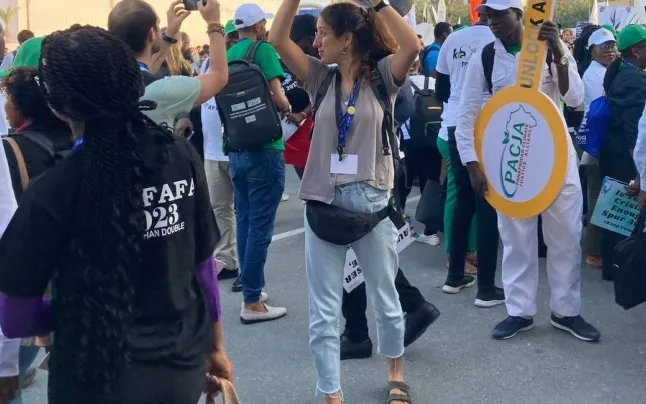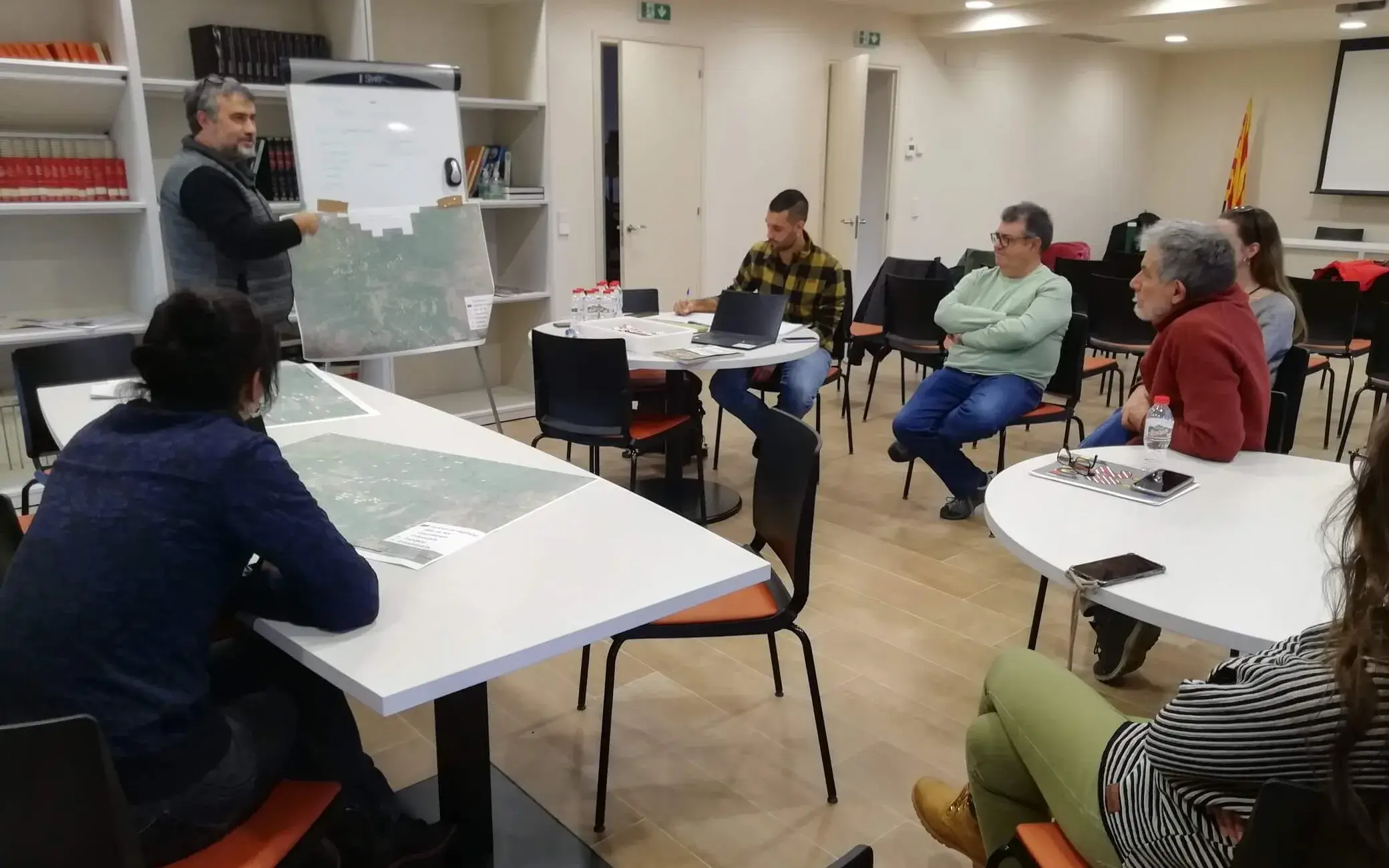Clàudia Custodio: "The low participation of civil society at COP28 will have an impact on the agreements"
The researcher of the Observatory of Debt in Globalization talks to us from Dubai about the negotiations that are being carried out at COP28.
One year after the general disappointment that caused the United Nations Conference on Climate Change in Sharm al-Sheikh, Egypt, in 2022, with an agreement to create a loss and damage fund both historical and unconcrete, comes the celebration of the COP28, this year's climate change summit, which is being held in Dubai, United Arab Emirates. Surrounded by some skepticism, especially due to the controversy surrounding the presidency of the summit, it is expected that hopeful agreements will be reached at COP28 in order to curb the climate emergency a>.
La Clàudia Custodio, researcher at the Global Debt Observatory (ODG ), present at COP28, talks to us about the negotiations that are taking place these days at Expo City in Dubai, what is expected that it is reflected in the final agreements, the role of the presidency in progress or not towards solutions and the (little) presence of civil society at the summit.
COP28 kicked off with a hopeful agreement to create a loss and damage fund for the countries most vulnerable to climate change. How do you rate it?
The loss and damage fund, as such, can be a step forward in supporting countries and communities that are on the front lines of climate impacts, as the possibility of small grants for these is envisaged. The purpose of this tool consists in the fact that the affected countries can ask for funds for reparation when phenomena arising from global warming occur. But the reality is that it is very difficult to calculate what the cost will be to compensate for these impacts.
One of the points that generates the most controversy is the fact that it is a voluntary fund, even for the richest countries.
The aspect of voluntariness is complicated, because in the end none of the agreements reached at COPs are binding, let's say legally. It is true that certain mechanisms can be used to make them so, but, generally, none of the agreements, nor the Paris Agreement, nor any of the other instruments that are approved, are binding in nature. So neither is the loss and damage fund.
In any case, all the contributions that have been announced so far are insufficient. There are countries that have already presented their proposal of what they will contribute to the fund, but it does not match what is needed to deal with climate change, but simply what they have decided is what suits them or what who consider that they must contribute the fund. Therefore, it is not considered at any time that an amount is reached that is necessary for a fund as it should be for losses and damages.
Will the World Bank be the body in charge of guaranteeing and managing the loss and damage fund for 4 years?
Apart from the fact that part of these funds would be taken away, as a management fee, and that it must be seen if it is an amount that is aware of or is above the that should really be taken to carry out this task, it must be remembered that the World Bank is an international body with power dynamics and that it is controlled by certain countries such as, for example, the United States. This implies that they could have some influence, in some way, in the management of this fund.
It is estimated that the amount that would be necessary to cover the needs that are foreseen, and that would have to be delivered to this loss and damage fund, is 400,000 million dollars a year. However, the amount that countries have so far said they will contribute voluntarily is far from this estimated figure.
A few weeks ago, from the UN it was stated that it will be very difficult to comply with the Paris Agreement to limit global warming by 1.5 degrees.
The Paris Agreement was historic because it succeeded, after the failure of the previous COP in Copenhagen, to reach a global agreement on how far emissions should be limited. In other words, so many fossil fuels had already been burned that it was impossible to stop climate change completely, but it was possible to try to keep temperature warming below 2 degrees compared to pre-industrial levels, and limit this increase by 1.5 degrees, the maximum if we want to ensure that life continues on this planet, according to science.
A mechanism was established to curb global warming. It was decided that countries should autonomously submit their Nationally Determined Contributions (NDCs) to achieve this global goal. As each country established how far it would reduce emissions under its criteria, when adding up the commitment plans, these were not enough to limit the temperature to 1.5 degrees. In addition, there are many countries that have not fulfilled even their own commitments, and others that have not even sent them.
Contributions to emissions must be analyzed in Dubai, and the Paris Agreement taken stock of. What commitments should countries make to reach the goal?
If we want to keep warming below 1.5 degrees, we believe that this balance sheet should also include a clear mention, and a real commitment, from all states to reduce fossil fuels. And it is that the Paris Agreement never mentioned that the cause of global warming was fossil fuels. And so it wasn't said that the route to keeping us within the established temperature limits had to go through abandoning fossil fuels. If this had been reflected, surely this agreement would not have been reached.
We must take stock of how we are going so far, expose everything we have achieved and establish the road map for how it must be done in order to limit the temperature to one and a half degrees. We should leave Dubai with new nationally determined contributions. However, we cannot limit ourselves to talking about reducing emissions, when climate change is an existing phenomenon, with real consequences on territories. Another of the things that must come out of this COP are climate financing mechanisms for the adaptation of these territories to the consequences that will arise, whether emissions are reduced or not.
"We should leave Dubai with new contributions determined at national level".
Do you think that at this COP28 a deadline will be set for fossil fuels?
Personally, I doubt very much that there will be an end date for fossil fuels, or an end date that will work. Saying that we have to leave fossil fuels underground by 2050 is like saying nothing, because in 30 years half of the planet's areas may already have burned. The increase in temperature is accelerating more and more, as well as the intensity of the phenomena resulting from global warming. Now, there is hope that a road map will be established to effectively reduce the use of fossil fuels.
Carbon budgets are other quite useful tools, but I don't think they appear in the agreements. It is a way of calculating how many emissions each country can burn at most, to keep us below one and a half degrees of warming, but taking into account historical responsibility.
Are we more likely to be talking about carbon markets or carbon capture technology solutions?
As for carbon capture, it's like a blank slate that is used to keep burning fossil fuels. It's not a solution, it's a distraction from what really needs to be done, and so it's unclear whether this will be part of the final deal. I think there are very strong interests in doing it that way, but there are also voices, especially from the global south, that say it can't be included. So we don't know if it will be or not, hopefully it won't be part of it. The United States, China and the United Arab Emirates are some of the countries that are pushing for these technologies
The issue of carbon markets, until now it was part of the Paris Agreement, but there have been very critical voices. It has been shown that it has not contributed to reducing emissions. Let's see if it's finally part of the deals. This is the week of the technical negotiations where the negotiating countries make the text proposals, which are the texts that will be debated next week, the political week. It's a very important week because what comes out of these negotiations sets some lines for next week, but in the end the political positions have the last word.
The European Union says it will be climate neutral by 2050. Is it an ambitious goal or does the effort need to be greater?
The concept of climate neutrality is problematic. If climate neutrality includes mechanisms such as carbon capture and storage, or carbon markets, i.e. the buying and selling of emissions, then no, 2050 is not enough. In the end, this means that fossil fuels can continue to be burned until 2050, as long as the emissions they produce are sold, for example, to other countries so that Europe can count towards zero emissions.
What would be necessary is to establish closer dates for the end of fossil fuels and also, in the end, the reduction, in the case of Europe above all, of the demand and consumption of energy. Not to pretend that we will replace all fossil energy with renewable or clean ones, because this will be very difficult or physically impossible, but to establish the end of fossil fuels and a plan to reduce energy consumption so that it is realistic.
"It is necessary to establish the end of fossil fuels and a plan to reduce the consumption of realistic energy".
You say that one of the aspects that most caught your attention at this COP28 is the lack of civil society participation.
Obstacles are being put to the participation of civil society. Usually, when there is a COP, there are mobilizations to show that society wants measures against the climate emergency and the social inequalities that arise from it. On the other hand, in this COP there are only mobilizations in the part of the area for accredited people, which is why there are far fewer people who can mobilize. In addition, the times when protest actions can take place are increasingly limited, and some areas in which to take actions have been removed.
Apart from that, the high-level debates, which are the negotiation part of the COP, must be open to civil society to act as an observer. But on numerous occasions, different colleagues have told us that they have not been able to attend because they are told that the room is full, but it turns out that this is not the case. There seems to be some kind of strategy to silence civil society and not let us do our work.
What is the role of civil society in COP?
Civil society is very important. They are people who voluntarily participate in these summits, to make clear demands. As I said, they play the role of observers, which is a guarantee of transparency in the negotiations. In the end, civil society fights for humanity. Therefore, their presence is very important. So, the fact that there is less participation by civil society, for various reasons, is problematic, and this will certainly be reflected in the agreements because the people who negotiate and the political positions will be under less pressure.
"It seems that there is some kind of strategy to silence civil society and not let us do our work".
How does it affect the credibility of the COP that President Sultan al-Jaber calls into question that the demand to eliminate fossil fuels has no basis in science?
At no time has the presidency of the COP tried to hide its intentions. The speech is about achieving a global agreement, but he has been the first to say that it is necessary for the lobbies of the fossil industry to participate in the negotiations. And in fact, this is the year with the most lobbyists from the fossil industry in the history of COPs, over 2,400 lobbyists from the oil and gas industry. A few days ago, a BBC leak said, for example, that the presidency intended to use the COP as a space to reach agreements and deals to extract oil and gas, with other countries.
The presidency is one of the most worrying points of this summit, as it takes place in a country where a third of the economy depends on oil. It is also an issue that has made many people in civil society not participate due to politics. If the presidency, which has a very clear influence on the negotiations, belongs to an entrepreneur from the fossil industry, then they believe that nothing good can come of this COP.







Add new comment